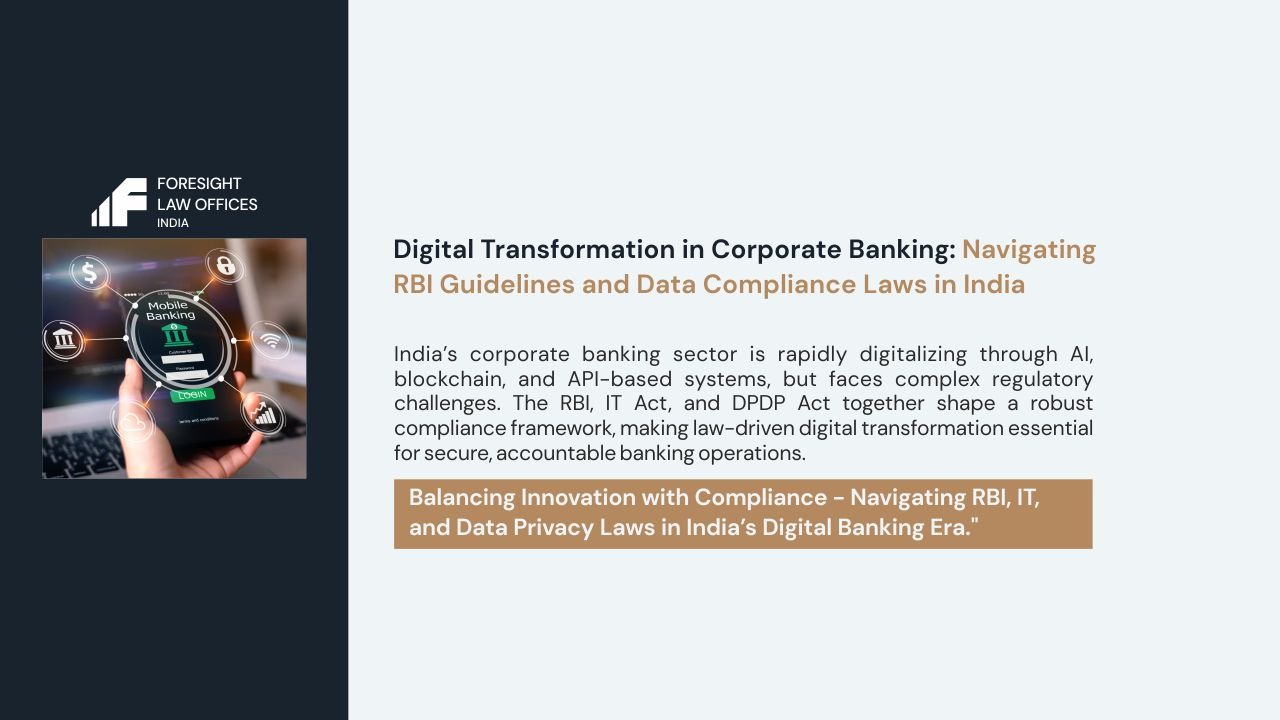The Indian banking sector is undergoing an unprecedented digital transformation. From automated credit evaluations to blockchain-based trade financing and AI-powered compliance tools, digitalization is reshaping how corporate banking operates. Yet, this innovation comes with complex regulatory and legal challenges. The Reserve Bank of India (RBI), the Information Technology Act, 2000 (IT Act), and the new Digital Personal Data Protection Act, 2023 (DPDP Act) together form the backbone of India’s evolving digital banking legal framework.
As corporate banks and fintech partners increasingly rely on technology-driven models, understanding and complying with these legal and regulatory mandates is crucial to avoiding operational risks, penalties, and reputational damage.
The Digital Transformation Imperative in Corporate Banking
Corporate banking today has evolved far beyond manual processes and traditional relationship-based models. The sector is rapidly embracing digital transformation, marked by the integration of advanced technologies across operations.
Online treasury management systems now allow real-time liquidity tracking, while API-based lending and trade platforms have streamlined documentation, credit evaluation, and approval cycles. Artificial intelligence is increasingly being deployed for compliance monitoring, automating audit trails and enhancing fraud detection.
Meanwhile, cloud computing and blockchain solutions are enabling greater scalability, transparency, and operational efficiency across banking networks. However, this digital evolution also brings complex challenges, particularly in the areas of data privacy, cybersecurity, and regulatory compliance, all of which fall squarely within the ambit of India’s banking and technology laws.
- RBI’s Regulatory Framework: Guiding Digital Evolution
The Reserve Bank of India has taken an active regulatory approach to balance innovation with consumer protection and systemic stability. Key circulars and frameworks govern digital transformation in corporate and retail banking alike.
| Date / Period | Regulation / Circular / Framework | Applicability & Scope | Key Provisions / Highlights | Compliance Implications for Corporate Banking & Fintechs |
| May 8, 2025 | Reserve Bank of India (Digital Lending) Directions, 2025 | Applies to all Regulated Entities (REs) – Banks, NBFCs, HFCs, AIFIs, and their Lending Service Providers (LSPs) | 1. Replaces 2022–23 digital lending circulars
2. Mandates written agreements with LSPs 3. LSPs cannot store borrower data except minimal fields 4. Creditworthiness norms based on age, occupation, income 5. Clear Key Fact Statements (KFS) and consent regimes 6. Multi-lender arrangement compliance from Nov 2025 |
1. Banks are fully accountable for LSP actions
2.Must implement data-sharing and consent architecture 3. Revise outsourcing contracts 4. Update KFS and loan app disclosures 5. Review tech stack for compliance logs and audit trails |
| July 2025 (Draft) | RBI (Digital Banking Channels Authorisation) Directions, 2025 – Draft | Scheduled Commercial Banks, Co-operative Banks, Payments Banks | 1. Defines “Digital Banking Channels” – internet, mobile, kiosk-based, API channels
2. Differentiates “View-only” vs. “Transactional” digital services 3. Banks must seek RBI authorisation for new channels 4. Banks cannot compel digital-only onboarding; must offer physical alternatives 5. Requires core banking integration, IPv6 readiness, business continuity & risk controls |
1.Review and upgrade IT & compliance infrastructure
2. Incorporate customer choice clauses in service agreements 3. Prepare for eventual mandatory channel authorisation filings once finalised |
| June 2025 | Revised KYC (Customer Onboarding) Framework | All Banks, NBFCs, Fintechs | 1. Introduces Video-based Customer Identification (V-CIP) and non-face-to-face (NFTF) onboarding
2. Allows use of Aadhaar authentication + biometric matching for both individuals and corporate representatives 3. Simplifies periodic KYC updates using digital signatures |
1.Enables fully digital client onboarding for corporate accounts
2. Requires updates to KYC Policy & internal audit systems 3. Must integrate secure biometric verification APIs |
| April 2025 | Liquidity Coverage Ratio (LCR) – Digital Deposit Buffer Revision | Scheduled Banks | 1. RBI revised run-off rate for digitally accessible retail deposits to 2.5 % (down from proposed 5 %)
2.Implementation deferred to April 2026 |
1. Impacts liquidity risk modelling in digital banking
2. Corporate treasury divisions must reassess liquidity buffers |
| September 2025 | Revised Authentication Guidelines for Digital Payments | All Banks & Payment Operators | 1. Introduces risk-based authentication beyond two-factor system
2. Allows flexibility for low-value or low-risk transactions 3.Effective from April 2026 |
1. Requires technology overhaul of payment gateways
2. Banks must deploy AI-based risk scoring for authentication decisions |
| January 2024 – Ongoing | Cybersecurity Framework for Banks (Enhanced Supervisory Directions) | All Scheduled Commercial Banks | 1. Mandatory Cyber Risk Management Committee at Board level
2. Periodic Vulnerability Assessment & Penetration Testing (VAPT) every 6 months 3. 24-hour cyber incident reporting to RBI and CERT-In 4. Stress testing of cloud and data centre infrastructure |
1. Corporate banks must adopt integrated SOC (Security Operations Centres)
2. Review cloud service contracts for RBI audit rights and data localisation clauses |
| Annual Report 2025-26 | Strategic Priorities Announced by RBI | Sector-wide (Banks, NBFCs, Fintechs, Payment Systems) | 1. Focus areas: Digital transformation, cyber resilience, financial inclusion, RegTech, and payment system governance
2. Encourages adoption of AI-based regulatory compliance tools |
1. Banks expected to integrate RegTech dashboards
2. Legal and compliance teams must synchronise data governance with RBI reporting systems |
Legal Framework: IT Act and DPDP Act
Beyond the RBI’s supervisory ambit, digital banking operations intersect significantly with India’s broader technology and privacy laws.
- IT Act, 2000 – The Foundational Cyber Law
The Information Technology Act, 2000 and its associated rules remain the cornerstone of India’s electronic transactions and cybersecurity regulation.
Key provisions relevant to corporate banking include:
- Section 43A – Liability for failure to protect sensitive personal data, imposing compensation obligations on negligent entities.
- Information Technology (Reasonable Security Practices and Procedures and Sensitive Personal Data or Information) Rules, 2011 – Mandate data privacy policies, consent for information sharing, and adherence to recognized security standards like ISO/IEC 27001.
- Section 66 and 72A – Penalize cyber fraud, unauthorized access, and misuse of data.
- Section 85 – Establishes vicarious liability for companies and their directors if offences are committed with their consent or negligence.
This framework has become increasingly critical as digital banking systems face sophisticated cyberattacks and data breaches.
- Digital Personal Data Protection Act, 2023 (DPDP Act)
The DPDP Act, enacted in 2023, represents India’s first comprehensive privacy legislation, directly impacting banks and fintech entities handling customer and corporate data.
Key Compliance Obligations:
- Consent and Purpose Limitation – Data can only be processed with explicit consent and for specified purposes.
- Data Fiduciary Obligations – Banks and financial institutions are classified as “data fiduciaries” responsible for lawful processing and protection of personal data.
- Data Breach Reporting – Mandatory notification of breaches to the Data Protection Board and affected parties.
- Cross-border Transfers – Permitted only to countries notified by the Central Government, aligning with India’s data localization objectives.
- Penalties – Can range up to ₹250 crore for significant non-compliance.
For corporate banking, which involves sensitive financial data of large entities, compliance under the DPDP Act must align with existing RBI cybersecurity and IT Act obligations, a multi-layered compliance ecosystem.
Contractual and Operational Implications for Banks and Fintechs
As banks increasingly rely on digital vendors, the legal architecture of contracts gains strategic importance. Every outsourcing or fintech partnership agreement should address:
- Data Ownership and Confidentiality: Defining ownership of generated data and ensuring fintech partners cannot commercially exploit sensitive information.
- Indemnity and Limitation of Liability: Covering breaches of data security, compliance failures, and unauthorized disclosures.
- Regulatory Audit and Inspection Rights: Allowing banks (and the RBI) to inspect vendor operations.
- Termination and Continuity Provisions: Ensuring uninterrupted service in case of vendor insolvency or regulatory action.
Corporate legal teams and banking lawyers must ensure that such agreements reflect regulatory intent and compliance on traceability, a trend gaining significance in recent RBI supervisory inspections.
Challenges in Compliance and Implementation
Despite the clarity of regulations, several practical and legal challenges persist:
- Multiplicity of Regulations: RBI norms, IT Act, DPDP Act, and PMLA obligations often overlap, creating interpretative challenges.
- Technology Outpacing Regulation: Emerging tools like AI-based lending or blockchain settlements outstrip existing legal definitions.
- Cross-border Data Flow Risks: Multinational corporations’ treasury operations often involve offshore data processing, which may conflict with data localization expectations.
- Cybersecurity Skill Gap: Smaller banks struggle to maintain the cybersecurity resilience expected by regulators.
These gaps underscore the need for continuous legal-technical collaboration within corporate banking operations.
Way Forward: Compliance as a Strategic Advantage
The future of corporate banking lies in secure, transparent, and law-compliant digital ecosystems. Legal compliance should not be viewed as a barrier but as a strategic enabler that builds client trust and institutional resilience.
Key recommendations include:
- Establishing cross-functional compliance committees combining legal, IT, and audit expertise.
- Investing in RegTech (Regulatory Technology) solutions that automate compliance reporting and risk monitoring.
- Conducting regular cyber audits aligned with RBI and CERT-In frameworks.
- Implementing data governance policies in line with DPDP Act requirements.
- Building contractual templates reflecting the latest RBI and privacy law expectations.
As India continues to push toward a fully digital financial ecosystem, the legal discipline surrounding data protection and banking technology will only deepen.
Conclusion
Digital transformation in corporate banking is no longer optional, it is inevitable. However, innovation must coexist with compliance. The RBI’s evolving digital lending and cybersecurity frameworks, the IT Act’s data protection standards, and the DPDP Act’s privacy mandates together create a robust legal structure designed to safeguard financial integrity and consumer trust.
For banks, fintech partners, and corporate clients, the key lies in proactive compliance, adopting a “law-by-design” approach where legal obligations are embedded in every digital process. With expert guidance from banking and fintech lawyers, institutions can not only mitigate risk but also position themselves as trusted digital leaders in India’s fast-evolving financial landscape.






